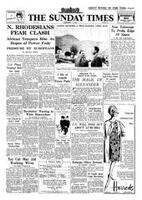rebellion
Item set
- Title
- rebellion
- Description
- A collection of news items related to rebellion.
Items
-
Winning struggle to reestablish African culture alongside the economic revolution"Although economic considerations now outweigh most others in the minds of most African people and their leaders in their quest for national images, there is in Nigeria, as in many other African countries, a growing cultural awareness in the face of the political turmoil that plagues most of the continent....Haunted by the knowledge that these ancient kingdoms [of Africa] had well-developed cultural and political organizations of their own, today's African countries are at the crossroads...The dilemma of most African countries is to find that way forward which involves a marriage between economics, culture and politics..."
-
 South African poet faces the death penalty Breyten Breytenbach, the anti-apartheid poet, was sent for trial in the Supreme Court today on charges carrying the death penalty. Mr Breytenbach, aged 36, is accused under the Terrorism and Anti-Communism Acts of helping to set up an illegal organization to promote armed struggle in South Africa intended to overthrow the white government... Mr Breytenbach is said to have been involved not only during his latest visit, but during a well-publicized visit in 1973, when he brought his wife. They are not allowed to live together under South African's racial laws.
South African poet faces the death penalty Breyten Breytenbach, the anti-apartheid poet, was sent for trial in the Supreme Court today on charges carrying the death penalty. Mr Breytenbach, aged 36, is accused under the Terrorism and Anti-Communism Acts of helping to set up an illegal organization to promote armed struggle in South Africa intended to overthrow the white government... Mr Breytenbach is said to have been involved not only during his latest visit, but during a well-publicized visit in 1973, when he brought his wife. They are not allowed to live together under South African's racial laws. -
Progress in Nigeria since civil warA 10-page Special Report on Nigeria will appear in The Times on Monday. Less than three years since the Biafran secession move collapsed the Nigerian civil war has been largely forgotten. Wole Soyinka, Africa's leading playwright, for whom it remains a vivid memory and who was imprisoned for nearly two years in solitary confinement, talks in the report revealingly about his country and his own future. Peter Hopkirk reports on the mood today among former Biafrans, and Cyprian Ekwensi, the novelist, writes on Africa's "rediscovery" of its cultural heritage.
-
Poet fights apartheid with his penMr Breyten Breytenbach, the Afrikaans poet, who arrived here on Sunday after being unexpectedly freed from prison in South Africa, said yesterday that he would not continue his political fight against apartheid. "I realize that I am not a politician," he said in an television interview. "But my whole life is against this type of situation, this type of ideology, in my private and professional life, as a poet and painter." Asking if he would continue his struggle through his poems and paintings, Mr Breytenbach said: "Yes, that will be my way." Mr Breytenbach, aged 44, was released on Thursday after serving seven years of a nine-year sentence on charges of plotting to overthrow the South African Government. At his trial he had admitted actively supporting the banned African National Congress. Looking fit and well, Mr Breytenbach said that he had seven years of poetry written in prison which he hoped to prepare for publication.
-
Playwright's denial on BiafraNigeria's leading playwright, Wole Soyinka, aged 33, has smuggled a letter out of his prison cell here, denying emphatically that he confessed to aiding the secessionist regime of the former Eastern Region. In a 202-word note written on a small piece of paper, Mr. Soyinka, who has been in custody since August 17, accused the Government of seeking to discredt him and his efforts to bring about a cease-fire in the civil war. Chief Anthony Enahoro, Federal Commissioner for Information, told journalists here on October 28 that Mr. Soyinka had admitted agreeing to spy for the Biafrans, to help them buy arms and to work "for the overthrow of the Federal Government." The commissioner said the playwright confessed to meeting Biafran leaders in their acpital at Enugu on August 6, and in the Mid-West capital of Benin three days later when it was seized by rebel forces under the command of Lieutenant Colonel Victor Banjo....
-
London DiaryPresident Senghor of Senegal, who left London yesterday after a conspicuously successful five-day official visit, had a lively discussion on English and French literature with the Queen at a luncheon party in his honour. Both agreed that State duties made it difficult to devote as much time to reading as they would wish. The President said he insisted on spending from 9 to 11 each morning at his books. M. Senghor, an outstanding French poet, is an admirer of Stephen Spender and Dylan Thomas and has translated both into French. He would like to do the same with T. S. Eliot but finds him "too difficult for translation." He hopes the British Council will send poets and writers on lecture tours of Senegal. President Senghor was captured while fighting with the French Resistance. A brilliant linguist, he became the prison camp's interpreter.
-
 Katanga Offers Reward "The leaflets repeat offers of £3,000 rewards offered by the government for Mr. Lumumba and two of his companions, Mr. Okito and Mr. Mpolo."
Katanga Offers Reward "The leaflets repeat offers of £3,000 rewards offered by the government for Mr. Lumumba and two of his companions, Mr. Okito and Mr. Mpolo." -
 Katanga Writes Off Tshombe but is Still Defiant "Few responsible people in Katanga expect to see President Tshombe again."
Katanga Writes Off Tshombe but is Still Defiant "Few responsible people in Katanga expect to see President Tshombe again." -
 Stranger's Voice "At their best they put you into the skinnot merely of the black but the oppreseed everywhere."
Stranger's Voice "At their best they put you into the skinnot merely of the black but the oppreseed everywhere."



